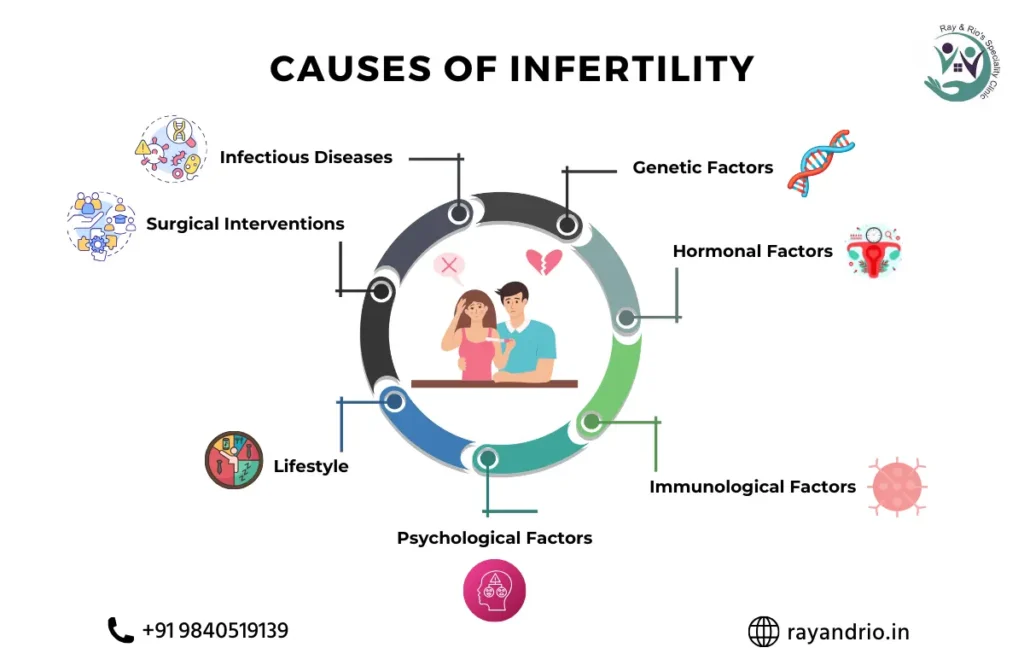Infertility can be an emotional and frustrating journey for many couples trying to conceive. If you’ve been struggling to get pregnant, you may be asking yourself: Is infertility curable? The good news is that many cases of infertility can be treated, and in some situations, it can even be reversed. However, the answer depends on the cause of infertility and individual circumstances.
In this blog post, we will dive deep into the question Is infertility curable? We’ll explore what infertility is, its common causes, whether it can be cured, and the available treatment options. We’ll also discuss whether infertility is genetic and how it can impact both men and women. By the end, you’ll have a better understanding of infertility and the steps you can take toward parenthood.

What Is Infertility?
Infertility is the inability to get pregnant after a year of trying (or six months if the woman is over 35). It can be due to male factors, female factors, or a combination of both. In some cases, doctors are unable to identify the exact cause of infertility, leading to what’s known as unexplained infertility.
There are two types of infertility:
- Primary infertility – When a couple has never been able to conceive.
- Secondary infertility – When a couple has had at least one child but is struggling to conceive again.
But the question remains: Is infertility curable? The answer depends on the underlying cause, which we will discuss in detail.
Infertility is more common than many people realize. According to the World Health Organization (WHO), around 1 in 6 couples experience some form of infertility. It affects both men and women equally.
Here are some key statistics:
- About 10-15% of couples struggle with infertility.
- Female infertility accounts for about 30-40% of cases.
- Male infertility is responsible for 30-40% of cases.
- Unexplained infertility makes up 10-20% of cases.
With so many people facing fertility challenges, the question of Is infertility curable? becomes even more critical. Let’s examine the causes to understand the possibilities.
What Are the Causes of Infertility?
Infertility can be caused by a variety of factors, including:
- Hormonal imbalances
- Structural issues (blocked fallopian tubes, uterine fibroids)
- Sperm disorders (low count, poor motility)
- Ovulation problems
- Age-related infertility
- Genetic factors
Common Causes of Infertility in Women
Women can face fertility challenges due to:
- Polycystic Ovary Syndrome (PCOS) – A hormonal disorder that affects ovulation.
- Endometriosis – A condition where tissue grows outside the uterus, causing pain and infertility.
- Blocked fallopian tubes – Prevents the egg from meeting the sperm.
- Age-related infertility – Egg quality declines with age, making conception harder.
- Thyroid disorders – Can affect hormone levels and ovulation.
Common Causes of Infertility in Men
Men can also experience infertility due to:
- Low sperm count – Fewer sperm reduce the chances of fertilization.
- Poor sperm motility – Sperm that can’t swim properly may not reach the egg.
- Hormonal imbalances – Affect testosterone levels and sperm production.
- Varicocele – Swollen veins in the scrotum that affect sperm quality.
- Genetic factors – Some men inherit conditions that reduce fertility.
Since genetics can play a role, many people ask, Is infertility hereditary in males? We’ll explore that next.
Is It Possible to Cure Infertility?
- Some cases of infertility are treatable, meaning that with the right medical intervention, a couple can conceive.
- Other cases are manageable, meaning treatments can increase the chances of pregnancy but don’t guarantee it.
- In some cases, infertility is permanent, especially if it’s caused by genetic conditions or irreversible damage.
Let’s explore the treatment options that can help improve fertility.
Treatment Options for Infertility
There are many medical treatments available for infertility. Here are the most common ones:
For Women
- Medications – Fertility drugs like Clomid or Letrozole can help stimulate ovulation.
- Surgery – Procedures to remove fibroids, endometriosis, or open blocked fallopian tubes.
- Assisted reproductive technology (ART) – IVF (In Vitro Fertilization) and IUI (Intrauterine Insemination) help increase pregnancy chances.
For Men
- Lifestyle changes – A healthier diet, quitting smoking, and reducing stress can improve sperm quality.
- Medications – Hormonal treatments can help balance testosterone and improve sperm production.
- Surgery – Procedures like varicocele repair can improve sperm health.
For couples still wondering, Is infertility curable?, these treatments offer hope, but success varies from person to person.
Is Infertility Genetic?
Infertility and genetics are closely linked, raising questions like, Is infertility hereditary in males? Research suggests that some cases of male infertility are genetic, including conditions like Y chromosome microdeletions and Klinefelter syndrome. While not all infertility is hereditary, genetic factors can play a significant role in reproductive health and fertility issues.
The answer is: Yes, in some cases.
- Certain genetic disorders can cause infertility in both men and women.
- Chromosomal abnormalities like Klinefelter syndrome in men can lead to poor sperm production.
- Women with Turner syndrome may struggle with fertility.
- Family history can increase the risk of conditions like PCOS or endometriosis.
If infertility runs in your family, it’s a good idea to discuss genetic testing with your doctor.
Is Infertility Permanent?
The good news is that infertility is not always permanent. While some causes are irreversible, many people can improve their fertility with treatment.
Factors that may make infertility permanent include:
- Severe genetic conditions affecting the reproductive system.
- Complete absence of sperm or eggs (rare but possible).
- Damage from untreated infections or surgeries.
However, many forms of infertility can be treated or managed, leading to successful pregnancies.
Conclusion
So, is infertility curable? The answer depends on the cause. Many cases of infertility can be treated or managed with modern medicine, while others may require alternative solutions. If you or someone you love is struggling with infertility, don’t lose hope—there are many options available.
